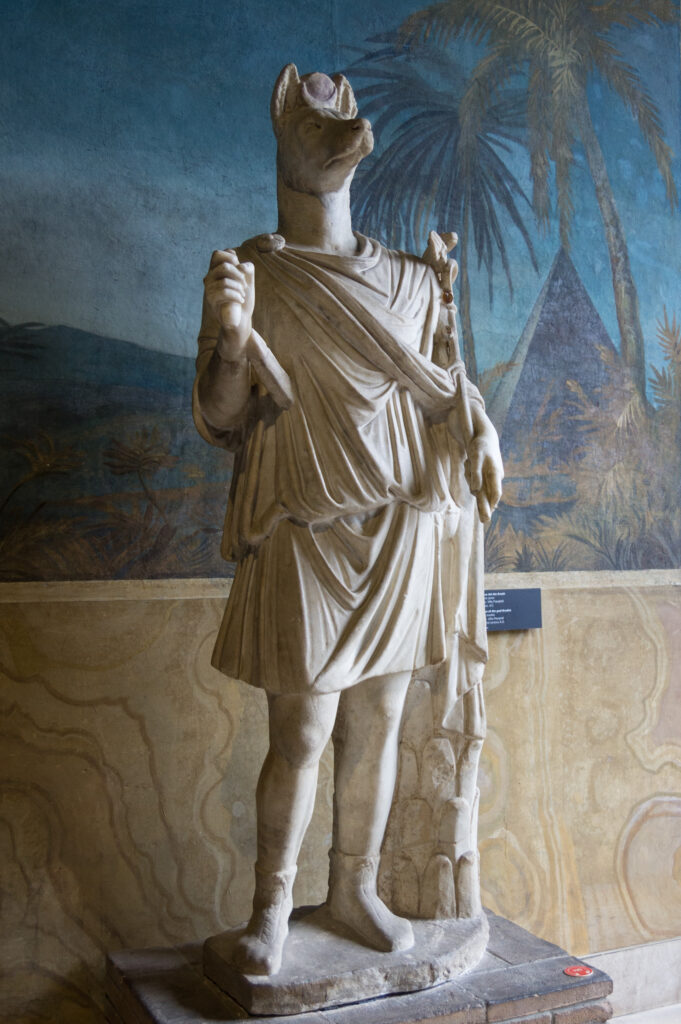
I’ve recently been doing a research deep-dive into the god Hermanubis, the results of which I’ll be presenting in a future blog post. In the meantime, however, I’ve come across a particularly curious bit of information regarding his most popular epithet. Almost every English-language source I’ve encountered (and one Italian source as well) gives the name “APHEROU” as a name of the god, ostensibly meaning “way-opener”.
I regret to inform you that this information is dead wrong.
The misunderstanding derives from Gordon White’s The Chaos Protocols, in which he echoes a statement given by David Gordon White (no relation) in his 1991 book Myths of the Dog-Man (pp. 43-44). In this text, the author puts forward an assertion that “Anubis was also called the ‘Way-Opener’ (Apherou, Oupherou)” and relates that the name of St. Christopher can be read not merely as Christo-phoros (lit. “Christ-bearer”) but also Christ-Apherou, “the way-opener of the Christ”, pointing out that this means he represents “a fusion of names and functions of the same order as Hermanubis”.
While this hypothesis has been refuted by David Woods in his 1994 article “St. Christopher, Bishop Peter of Attalia, and the Cohors Marmaritarum: A Fresh Examination”, as reported by Sarah Victoria Buxton, the “Apherou” epithet has continued to work its way into the popular imagination (at least to the extent that any work on Hermanubis can be considered “popular”).
It turns out that David Gordon White sourced this information from Claude Gaignebet’s two-volume 1986 work, A plus hault sens : l’ésotérisme spirituel et charnel de Rabelais. While Gaignebet may have been a notable folklorist and ethnologist, it seems apparent that he was either sorely lacking in knowledge of the Egyptian language or was more interested in popular etymology than in the historical variety.
This is the sole source for the “Apherou” epithet, and it falls apart upon even a cursory attempt to corroborate its veracity. Faulkner’s A Concise Dictionary of Middle Egyptian yields wp or wpi for “open”, pronounced “wep” or “oop”, and one can see how “ap” in “Apherou” could be derived from this word. There is however absolutely no word meaning “road” which bears even a remote resemblance to “herou”.
On the other hand, there is a very well-known phrase in Middle Egyptian which does bear fruit. This is Wp-wꜣwt, from the aforementioned wp plus the word wꜣt meaning “road” or “way”. It is also the name of the god Wepwawet, whose name means precisely “way-opener”, and which Faulkner notes is also an epithet of Anubis despite also being a separate and distinct deity unto himself.
And there you have it. Thanks to the confusion of a single author, Claude Gaignebet, later perpetuated via Gordon White, literally every single person who works with Hermanubis for the better part of the last decade is likely using an epithet with an entirely spurious etymology. I therefore strongly advocate for replacing “Apherou” with “Wepwawet” in your workings with him, for obvious reason.
UPDATE: Yuri Abietti, the author of the La Stella a Otto Punte blog (which was the Italian source I mentioned in my article) has done me the honor of translating this post into Italian. You can find his translation here. Thank you, Yuri!
Hi Nick, I’m Yuri, the author of the article on Hermanubis in Italian you linked in your post! First of all, I’d like to thank you for your research, what you came across is very useful and I’m glad to correct my article accordingly. On this regard, I would like to ask your permission to translate this post (of course, with a link to this page on your website and giving full credits), so that I can update my previous articles on the matter. Also, if you are planning to do a follow-up on Hermanubis, I would be really interested in translating it on my blog (always giving full credit to you and putting a link to the original source).
Thank you very much in advance, hope to hear from you soon!
Greetings from Italy!
Thank you so much–and thanks for tracking me down on Facebook this morning. (For anyone else who may be reading this comment, I rarely get anything other than spam messages as comments on my blog, so I seldom review them; Discord is the best way to reach me, and you can find my Discord info on my About Me page.) While we already connected there, I wanted to thank you here as well, and to publicly share my blessing for the translation. I look forward to keeping in touch!